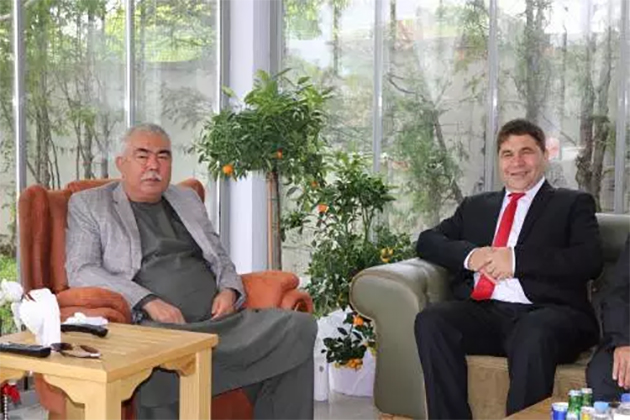Faryab province is highly factionalized with repeated clashesbetween two arch rival parties: Junbish-i-MilliIslami and Jamiat-e-Islami party. Both are supported largely by two different ethnicities, namely Uzbeks and Tajiks, respectively and both supported the incumbent National Unity Government. Anti Government Entities (AGEs) including Taliban control larger parts of the province, mainly rural areas. Maimana is in the valley and all the hills around the valley are under the influence of AGEs and Taliban. Political factionalism and threat of Taliban have forced each group to have their own militias as their dedicated and committed force. These militias have also been utilized by the national government directly or indirectly to limit Taliban to some part of rural areas and preventing them from taking over the district centers and provincial center.
Many of these regional armed leaders were instrumental in putting break on Taliban expansion through their induction into Afghan Local Police (ALP), an initiative of the government to stabilize security situation. Qaysar was one of such district where ALP project was launched. These leaders exploited the weakness of the state and very tactfully, introduced part of their group into ALP and kept a part as back up force for their needs. Also, the leaders close to government were able to push their group members more into ALP and started getting state support including heavy weapons and vehicles, which further fuelled local conflicts and disputes between Junbish and Jamiat. Loose accountability and managerial mechanisms allowed them to divert government resources to forward their interests and also broadened their revenue stream to consolidate their powers and financial resources. These militias have been supported by the state and also armedby the state time to time. So, these are the field realities and political maneuverings in the province and its districts. The state building is a complex art where these maneuverings are undertaken in the larger interest of the state, which are peace, security and development.
But in the process, the state should not loose its primary focus: providing safety to its people and bringing stability for good governance and economic development. Threats by external sources, which is Taliban and AGEs, are the primary concern for the people and then internal threats, which are: violencecaused by factionalism.
On both aspects, the government has been loosing focus and ground. The trust in the security institutions dipped to the lowest level, when Maimana was under threat in2015 from Taliban and it was about to collapse. Residents of Maimana openly assert that security forces deserted their checkposts and police stations. They claim that ‘citizen militias prevented a major catastrophe in Maimana’ and so ‘the pubic confidence in government forces is very low and that in people’s forces and militia is very high’. In the last three years, Afghan security forces have improved their capabilities but they need to win the hearts of the people to develop trust. Even now, residents of Maimana refer to the threats of 2015 and don’t trust security system. On account of this, whenever a campaign was launched to regulate citizen militia weapons, it could not muster much support and had to abandon efforts. Also, the criminal justice system and governance, which are used to address internal threats, could not be made functional. The read out charges of attorney general office (AGO) covers a period of few years and one wonders why these could not be brought forward as and when occurred. Whether there is mutual coexistence where insurgency and part of government both complement each other? This possibility cannot be ruled out as many times, the check points/ check posts are attacked without casualties, seemingly as per convenience. Telephone towers are switched off in evening and roads are left free of government security at dusk.
The same Qaisari asked the AGO to interrogate and take action against his rival group last year in March-April 2017 for killing his son andfew others in a clash. He also threatened that failing which he would be forced to take revenge. The rebel groups were supported, armed and authorized by the government to maintain security in outskirts of Maimana and they were considered as Community Defence Force having close links with police in Maimana. Reportedly, the clash got erupted over some trivial issue with his son, who was on leave to Maimana during his college holidays. He alleged a section of police to facilitate the rival group members fleeingtheir dwellings to Taliban areas across few hills. The same people who were armed by the government later joined Taliban with all their heavy weapons and Humvees.
Faryab province needs an exhaustive review of the security situation and then develop a comprehensive solution engaging whole of the provincial government including military, police, attorney general office, local governance and local communities. In the absence of that a culture of factional violence and revenge may continue and the communities may continue to rely on the militia of armed leaders for their safety needs. Revenge is retaliation and it has been promoting conflict in the region. Justice can restore the balance in the communities though its nature of impersonality, impartiality and rationality.
The government and more over the Ministry of Interior should develop a mechanism to gradually disciplining and reining such leaders in policing system and imposing accountability mechanisms:converting them from a product of militia system to police system and transforming ‘Revenge to Justice’. These efforts were never conceptualized and introduced. There are many such leaders in police who are double-edged swords and their skills and leadership may be utilized for state building and stability in their areas.
Home » Opinion » Lesson learned from the Nezamuddin Qaisari saga: Paradigm shift needed to transform ‘Revenge to Justice’ (P2)
Lesson learned from the Nezamuddin Qaisari saga: Paradigm shift needed to transform ‘Revenge to Justice’ (P2)
| Upendra Baghel

